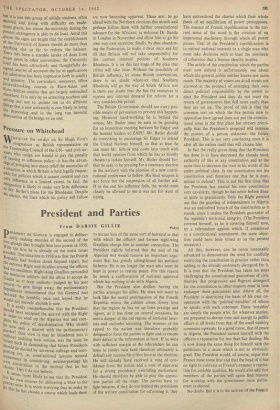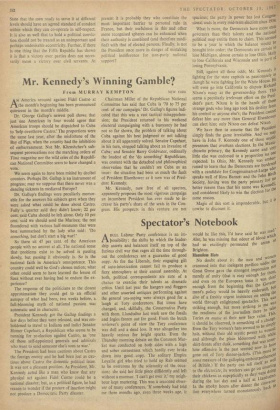President and Parties
PARIS
From DARSIE GILLIE
RESIDENT DE GAULLE is engaged in deliber- ately making enemies of the second of the two groups that brought him into power in 1958. With the first he is already on the worst terms possible. The situation in 1958 was that the Fourth Republic had broken down beyond repair, but had extreme Right and its allies among the officers "ad no candidate. Right-wing Gaullists persuaded the mutinous soldiers and the ultras to accept de Gaulle as at least unlikely—judged by his past record—to give things away; the parliamentary rePublicans remembered that the General had restored the republic once and hoped that he Would not entirely abolish it now. It is easily comprehensible that the President should have accepted the quarrel with the Right 14 order to wind up the Algerian war and corn- reete his policy of decolonisation. Why should now seek a quarrel with the parliamentary Parties? One view is that he blundered into it ;iraised realising how serious was the issue he sed both in demanding that future Presidents tintild be elected by universal suffrage and inter- Pureting (or, as constitutional lawyers seemed _rianimous in considering, misinterpreting) his c`).‘41 constitution in the method that he has chosen, This I do not believe. It seems more likely to me that the President rias his own reasons for delivering a blow to the Parties now It is more worrying that in order to "0 this he has chosen a course which leads them
to accuse him of the same sort of betrayal as that with which the officers and former right-wing Gaullists charge him in another connection. The President rightly believed that the end of the Algerian war would remove an important argu- ment that has greatly strengthened his position hitherto. He is no longer the man who must be kept in power to restore peace. For this reason he needs a reaffirmation of national approval which has nothing to do with Algeria.
But the President also dislikes having the parties amongst his allies. He does not want to look like the moral prolongation of the Fourth Republic minus the cabinet crises. Every time that the regime he has set up loses prestige and vigour, as it has done on several occasions, he sees a danger of the old regime of sectional inter- ests and outlooks returning. The manner of his appeal to the nation was therefore probably designed to force the parties to fight and to ensure their defeat at the referendum at least. If he wins with sufficient margin at the referendum he can hope to render vain (and therefore ultimately a defeat) any success his critics have at the election. He will already have received a vote of con- fidence from the nation and a vote of approval for a strong presidency overriding parliament. He should therefore be able to play the opposi- tion parties off the stage. The parties have to fight because, if they do not defend the provisions of the written constitution for reforming it, they
have surrendered the charter which their whole thesis of an equilibrium of power presupposes. The essence of French republicanism in the cur- rent sense of the word is the creation of an impersonal machinery through which all power passes. That of the President's republicanism is to entrust national interests to a single man who must take decisions with at least the minimum of coherence that a human identity implies.
The article of the constitution which the parties must now defend is unfortunately one about which the general public neither knows nor cares much. The majority of voters are at all events not alarmed at the prospect of enlarging their own direct political responsibility by the power to elect the President and they do not want the return of governments that fall more easily than they are set up. The proof of this is that the common text on which the five parties now in opposition have agreed does not put the constitu- tional issue in the first place but stresses princi- pally that the President's proposal will increase the powers of a person unknown—the future President. This is not very convincing since it is after all the nation itself that will choose him.
In fact the really grave thing that the President has done is to have decreased the already weak authority of this or any constitution and at the same time to decrease the trust in his words of the entire political class. Is the constitution not his constitution and therefore one that he is com- mitted to defend? This is not the first time that the President has treated his own constitution very cavalierly, though he has never before done so quite so gratuitously. Only the Right pointed out that the granting of independence to Algeria was an undoubted breach of the constitution as it stands, since it makes the President guarantor of the republic's territorial integrity. (The President covered himself, as he is covering himself now, by a referendum against which, if considered as a constitutional amendment, the same objec- tion could have been raised as on the present occasion.) All this, however, can be more reasonably advanced to demonstrate the need for carefully restricting the constitution in practice rather than adding to the already customary disregard for it. It is true that the President has taken no steps challenging the constitutional guarantees of civic liberties. But progressive and flagrant disregard for the constitution in other respects must in time endanger these guarantees also. Above all, the President is destroying the basis of his own co- operation with the 'political notables' of whom he speaks with such contempt. These 'notables' are simply the people who, for whatever motive, are prepared to devote time and energy to public affairs at all levels from that of the small country commune upwards. In a good cause, that of peace in Algeria, the President earned himself with the officers a reputation for less than fair dealing. He is now doing the same thing for himself with the politicians in a cause which is not so obviously good. The President would, of course, argue that France must come first and that the head of it has no right to cultivate at France's expense a reputa- tion for amiable qualities. He would also add that members of the parties will again find reasons for working with the government once parlia- ment is elected.
No doubt. But it is in the interest of the. French State that the men ready' to serve it at different levels should have an agreed standard of conduct within which they can co-operate in self-respect. It is also as well that to hold a political convic- tion should not be treated as an unimportant and perhaps undesirable eccentricity. Further, if there is one thing that the Fifth Republic has shown it is that a victory over parties does not neces- sarily mean a victory over civil servants. At present it is probably they who constitute the most important barrier to personal rule in France, but their usefulness in this and other more recognised spheres can be enhanced when their authority is combined (and therefore modi- fied) with that of elected persons. Finally, is not the President once more in danger of mistaking political indifference for non-party national support?















































 Previous page
Previous page